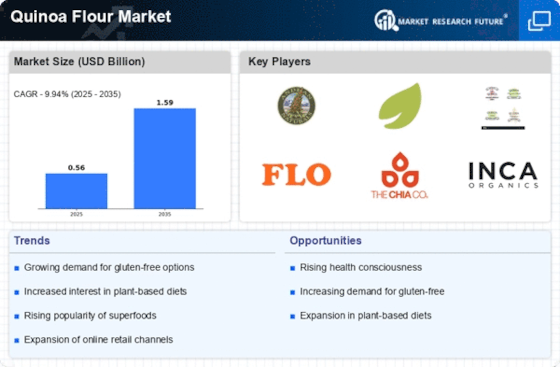Top Industry Leaders in the Quinoa Flour Market

The Quinoa Flour market has experienced significant growth in recent years, driven by the increasing consumer demand for gluten-free and nutritious food products. The competitive landscape of the Quinoa Flour market is characterized by the presence of several key players, each striving to gain a competitive edge in the industry. The strategies adopted by these players, factors influencing market share, new and emerging companies, industry news, and investment trends paint a comprehensive picture of the overall competitive scenario.
Key players in the Quinoa Flour market include.
- Northern Quinoa Production Corporation (Canada)
- Andean Valley Corporation (Bolivia)
- King Arthur Flour Company, Inc. (US)
- Bob's Red Mill Natural Foods, Inc. (US)
- The British Quinoa Company (UK)
- Nutriwish (India)
- Andean Naturals, Inc. (US)
- Dutch Quinoa Group BV (Netherland)
- Organic Farmers Co. (India).
Strategies Adopted:
common strategy adopted by key players is a focus on product innovation to meet the evolving consumer preferences and demands. For instance, The Quinoa Corporation has consistently introduced new quinoa flour variants to cater to different culinary needs. Ardent Mills, on the other hand, has invested in advanced milling technologies to enhance the quality of its quinoa flour products, thereby gaining a competitive advantage.
Strategic partnerships and collaborations have also played a crucial role in shaping the competitive landscape of the Quinoa Flour market. Companies like Andean Valley Corporation have entered into partnerships with local farmers and cooperatives to ensure a steady supply of high-quality quinoa, thereby securing a reliable source of raw materials. Such collaborations enable companies to strengthen their supply chain and enhance their market position.
Factors for Market Analysis:
Factors influencing market share analysis in the Quinoa Flour market are multifaceted. Brand reputation, product quality, pricing strategy, and distribution network are key determinants. Established players with a strong brand presence, coupled with a diverse product portfolio, often command a higher market share. Additionally, competitive pricing strategies and effective distribution channels contribute to a company's ability to capture and retain market share.
In the Quinoa Flour market, new and emerging companies are continuously entering the arena, adding dynamism to the competition. These companies often bring innovative approaches, such as sustainable farming practices and novel processing techniques. Their nimbleness and agility allow them to quickly adapt to market trends and cater to niche segments, posing a challenge to established players.
New & Emerging Companies:
Industry news and current company investment trends shed light on the dynamism of the Quinoa Flour market. Companies are increasingly investing in research and development to create value-added quinoa products, expanding their geographical presence, and strengthening their production capabilities. For example, Ancient Harvest announced a significant investment in a state-of-the-art processing facility to meet the growing demand for quinoa flour in the North American market.
Competitive Scenario:
The overall competitive scenario is influenced by a combination of market consolidation, innovation, and strategic alliances. Larger players often engage in mergers and acquisitions to expand their market reach and consolidate their position. This trend is evident in the acquisition of Dutch Quinoa Group by a global agribusiness conglomerate, aiming to leverage the former's expertise in quinoa production and processing.
Recent Development
In 2023, several notable developments have shaped the Quinoa Flour market. Market leaders have intensified their focus on sustainability, responding to the growing consumer consciousness regarding the environmental impact of food production. Companies like Bobs Red Mill Natural Foods have made substantial investments in sustainable farming practices, not only to meet consumer expectations but also to ensure the long-term viability of their supply chain.
Moreover, the Quinoa Flour market has witnessed increased attention from investors, indicating the industry's growth potential. Start-ups and emerging companies have secured significant funding to scale up their operations and compete with established players. This influx of capital is expected to drive further innovation and technological advancements in the quinoa processing sector.










